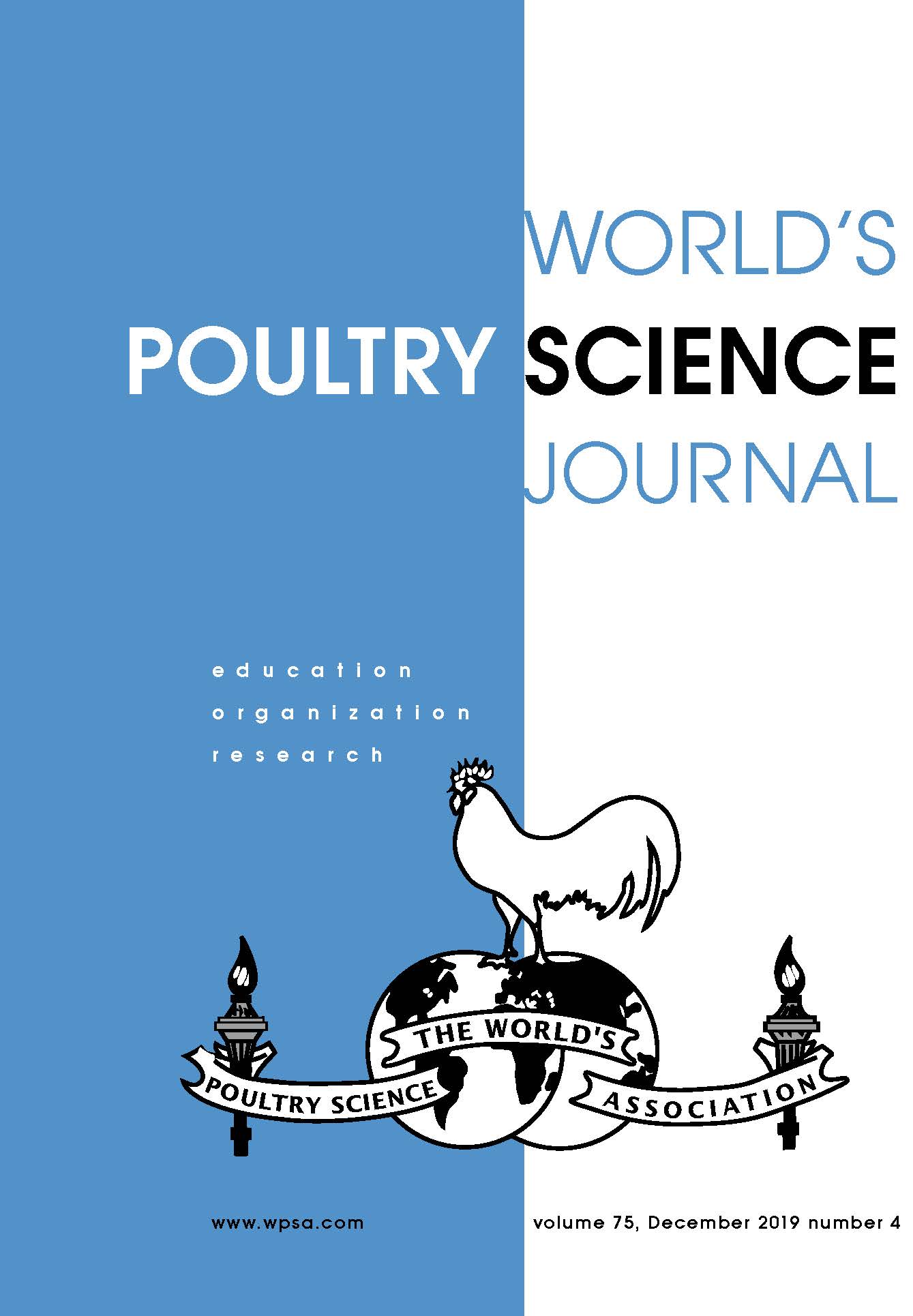Crossref Citations
This article has been cited by the following publications. This list is generated based on data provided by
Crossref.
Xia, Peng‐Fei
Pan, Xiong‐Fei
Chen, Chen
Wang, Yi
Ye, Yi
and
Pan, An
2020.
Dietary Intakes of Eggs and Cholesterol in Relation to All‐Cause and Heart Disease Mortality: A Prospective Cohort Study.
Journal of the American Heart Association,
Vol. 9,
Issue. 10,
Huang, Xiang
Dong, Kai
Liu, Lan
Luo, Xin
Yang, Ran
Song, Hongbo
Li, Shugang
and
Huang, Qun
2020.
Physicochemical and structural characteristics of nano eggshell calcium prepared by wet ball milling.
LWT,
Vol. 131,
Issue. ,
p.
109721.
Aditya, Sanprit
Stephen, Jaspin
and
Radhakrishnan, Mahendran
2021.
Utilization of eggshell waste in calcium-fortified foods and other industrial applications: A review.
Trends in Food Science & Technology,
Vol. 115,
Issue. ,
p.
422.
YANG, Ning
2021.
EGG PRODUCTION IN CHINA: CURRENT STATUS AND OUTLOOK.
Frontiers of Agricultural Science and Engineering,
Vol.
8
,
Issue.
1
,
p.
25
.
Zhao, Xiurong
Nie, Changsheng
Zhang, Jinxin
Li, Xinghua
Zhu, Tao
Guan, Zi
Chen, Yu
Wang, Liang
Lv, Xue Ze
Yang, Weifang
Jia, Yaxiong
Ning, Zhonghua
Li, Haiying
Qu, Changqing
Wang, Huie
and
Qu, Lujiang
2021.
Identification of candidate genomic regions for chicken egg number traits based on genome-wide association study.
BMC Genomics,
Vol. 22,
Issue. 1,
Torres, Rita Tinoco
Carvalho, João
Fernandes, Joana
Palmeira, Josman D.
Cunha, Mónica V.
and
Fonseca, Carlos
2021.
Mapping the scientific knowledge of antimicrobial resistance in food-producing animals.
One Health,
Vol. 13,
Issue. ,
p.
100324.
Nasiru, Mustapha Muhammad
Umair, Muhammad
Boateng, Evans Frimpong
Alnadari, Fawze
Wang, Zhaobin
Qian, Jing
Yan, Wenjing
Zhuang, Hong
and
Zhang, Jianhao
2022.
Synergetic Inhibition Effect of Plasma-Activated Water and Hydrogen Peroxide on Egg Pathogens: Inhibition Mechanism and Storage Stability.
SSRN Electronic Journal ,
Shao, Hao‐Tian
Yang, Fang
Chen, Jun‐Cheng
Zhang, Mei
Song, Zhe‐Wen
and
Yang, Fan
2022.
Pharmacokinetics of meloxicam in laying hens after single intravenous, oral, and intramuscular administration.
Journal of Veterinary Pharmacology and Therapeutics,
Vol. 45,
Issue. 5,
p.
488.
Chatterjee, R. N.
Rajkumar, U.
and
Prince, L. L. L.
2022.
Agriculture, Livestock Production and Aquaculture.
p.
205.
YAO, Yutong
ZHANG, Jing
ZHANG, Run
SHI, Yueru
AN, Peipei
HU, Xin
and
WAN, Youzhong
2022.
Optimization of preparation of calcium acetate from eggshell by Response Surface Methodology (RSM).
Food Science and Technology,
Vol. 42,
Issue. ,
Sukik, Layan
Liu, Jianghong
and
Shi, Zumin
2022.
Association between egg consumption and cognitive function among Chinese adults: long-term effect and interaction effect of iron intake.
British Journal of Nutrition,
Vol. 128,
Issue. 6,
p.
1180.
Mankad, Aditi
Hobman, Elizabeth V.
Carter, Lucy
and
Tizard, Mark
2022.
Ethical Eggs: Can Synthetic Biology Disrupt the Global Egg Production Industry?.
Frontiers in Sustainable Food Systems,
Vol. 6,
Issue. ,
Sinclair, Michelle
Lee, Natasha Y. P.
Hötzel, Maria José
de Luna, Maria Catalina T.
Sharma, Arvind
Idris, Musadiq
Islam, Mohammad Ariful
Iyasere, Oluwaseun S.
Navarro, Grisel
Ahmed, Abdelkareem A.
Curry, Michael
Burns, Georgette Leah
and
Marchant, Jeremy N.
2022.
Consumer attitudes towards egg production systems and hen welfare across the world.
Frontiers in Animal Science,
Vol. 3,
Issue. ,
YAO, Yutong
SHI, Yueru
AN, Peipei
ZHANG, Run
WANG, Zhaoying
HU, Xin
and
WAN, Youzhong
2022.
Optimization of preparation of calcium propionate from eggshell by Response Surface Methodology (RSM).
Food Science and Technology,
Vol. 42,
Issue. ,
Liu, Li
Chen, Qian
Yin, Lingqian
Tang, Yuan
Lin, Zhongzhen
Zhang, Donghao
and
Liu, Yiping
2023.
A Comparison of the Meat Quality, Nutritional Composition, Carcass Traits, and Fiber Characteristics of Different Muscular Tissues between Aged Indigenous Chickens and Commercial Laying Hens.
Foods,
Vol. 12,
Issue. 19,
p.
3680.
Liu, Jiayan
Fu, Yuxin
Zhou, Shuaishuai
Zhao, Pengyu
Zhao, Jian
Yang, Qinglin
Wu, Hao
Ding, Manyi
and
Li, Yao
2023.
Comparison of the effect of quercetin and daidzein on production performance, anti-oxidation, hormones, and cecal microflora in laying hens during the late laying period.
Poultry Science,
Vol. 102,
Issue. 6,
p.
102674.
Chen, Ruochen
Jiang, Caiyun
Li, Xingzheng
Shi, Xuefeng
Zhuang, Longyu
Zhou, Wenbin
Zhou, Chen
Xuan, Lin
Xu, Guiyun
and
Zheng, Jiangxia
2023.
Research on Chinese consumers' shell egg consumption preferences and the egg quality of functional eggs.
Poultry Science,
Vol. 102,
Issue. 10,
p.
103007.
Xie, Shunping
Hai, Chengying
He, Song
Lu, Huanhuan
Xu, Lu
Fu, Haiyan
and
Buccolieri, Alessandro
2023.
Discrimination of Free-Range and Caged Eggs by Chemometrics Analysis of the Elemental Profiles of Eggshell.
Journal of Analytical Methods in Chemistry,
Vol. 2023,
Issue. ,
p.
1.
Yang, Qing
Dwyer, Cathy M.
Vigors, Belinda
Zhao, Ruqian
Langford, Fritha M.
and
Radwan, Lamiaa Mostafa
2024.
Animal welfare with Chinese characteristics: Chinese poultry producers’ perceptions of, and attitudes towards, animal welfare.
PLOS ONE,
Vol. 19,
Issue. 7,
p.
e0307061.
Nasiru, Mustapha Muhammad
Boateng, Evans Frimpong
Umair, Muhammad
Alnadari, Fawze
Bassey, Anthony Pius
Qian, Jing
Yan, Wenjing
Li, Chunyang
and
Zhang, Jianhao
2024.
Decontamination of egg‐associated pathogens by plasma‐activated water and hydrogen peroxide.
Journal of Food Safety,
Vol. 44,
Issue. 3,


